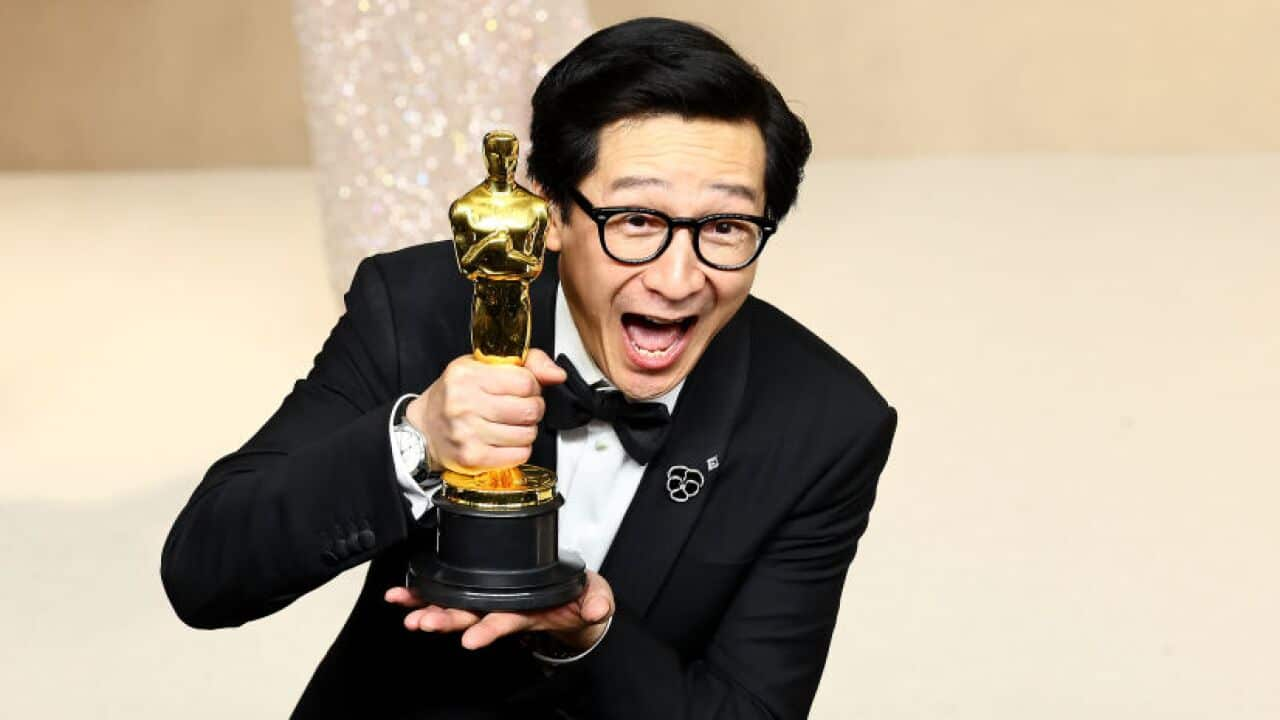“Oscars so... Asian?” Kal Penn quipped on The Daily Show after the huge night enjoyed by the cast and crew of Everything Everywhere All at Once. “So many Asian artists won and thanked their parents which was, like, so nice. Although, honestly, if their parents were anything like mine, they would be, like, ‘Okay.’”
If you are of Asian descent, you would totally get the joke, because although your parents would be excited for you, they would also move on from it quickly.
As filmmaker Tze Chun went on to tweet: “Asian parents this week be like “why haven’t you won an Oscar”?
Jokes aside, there was no denying it was a huge night, not just because Everything Everywhere All at Once swept most of the major categories at the Academy Awards, including Best Picture, Best Director, Best Actress, Best Supporting Actor, Best Supporting Actress, Best Original Screenplay and Best Film Editing – but it also as the most awarded sci-fi film of all time, and Michelle Yeoh became the first ever Asian woman to win the Oscar for Best Actress (and only the second woman of colour to nab the top accolade after Halle Berry in 2002).
“For all the little boys and girls who look like me, this is a beacon of hope and possibilities,” she said in her acceptance speech. “Dream big, dreams do come true.”
There wasn’t a dry eye in the audience when Ke Huy Quan gave his emotional speech after he won Best Supporting Actor. From auspicious beginnings as an ’80s child actor who starred as Short Round in 1984's Indiana Jones and the Temple of Doom and Data in The Goonies the following year, Quan found the roles dried up in his 20s, and he didn’t work as an actor for 30 years, instead retraining and finding work as a stunt coordinator, till the role of a lifetime in Everything Everywhere All at Once came along.
“My journey started on a boat. I spent a year in a refugee camp. Somehow, I ended up on Hollywood’s biggest stage!” Quan said in his teary acceptance speech. “They say stories like that only happen in the movies; I can’t believe it’s happening to me. This is the American dream!”
And then there was the film RRR, which became the first Indian feature film to win an Oscar, with “Naatu Naatu” taking home the award for best original song.
It was a night of celebration, not just for the awards being given out, but for the number of Asian actors and creators in attendance, too. People such as Mindy Kaling, Riz Ahmed and Malala showed the star power that Asian people now have in Hollywood.
It was a recognition of the complex roles that Asian actors now have available to them – as opposed to the stereotypes that once dominated roles offered to Asians (such as the geeky characters of Data and Short Round). Much of the increased complexity of roles available to Asian actors is because those behind the scenes come from the same background.
But it’s not time to rest on laurels just yet.
As sociologist and film scholar Nancy Wang Yuen : “While I am thrilled for all of the Asian #Oscar wins tonight, I want to emphasize that any history made speaks to historical racist/sexist barriers and dearth of opportunities, not because all of a sudden Asians are talented.”
Filipino-American actor JB Tadena also : “It is my sincere and honest hope that Ke’s win opens the door for the incredible talents out there who have been overlooked.”
The success of one or two films shouldn’t mean that change is no longer desperately needed.
It’s not easy to shake off nearly 200 years of reductive images and condescension
Back in 2021, Hollywood actress in Hollywood for The Washington Post. “I feel fortunate to have ‘moved the needle’ a little with some mainstream success, but it is circumscribed, and there is still much further to go. Progress in advancing perceptions on race in this country is not linear; it’s not easy to shake off nearly 200 years of reductive images and condescension,” Liu wrote.
More progress still needs to be made, no one is denying that. But for one special night, as a person of Asian descent, it felt good to be celebrated. Our stories are finally getting the mainstream success they deserve – and it has been a long time coming.
RECOMMENDED READING

We're finally seeing more South Asian diversity on our screens



